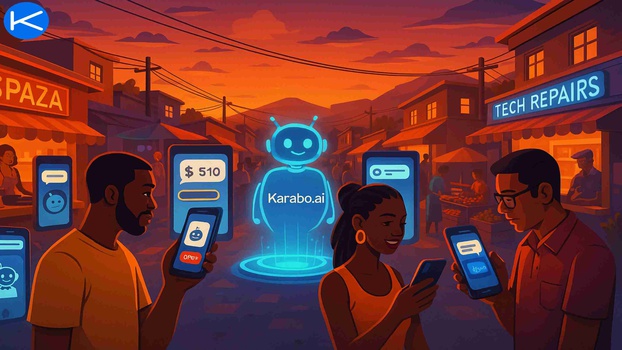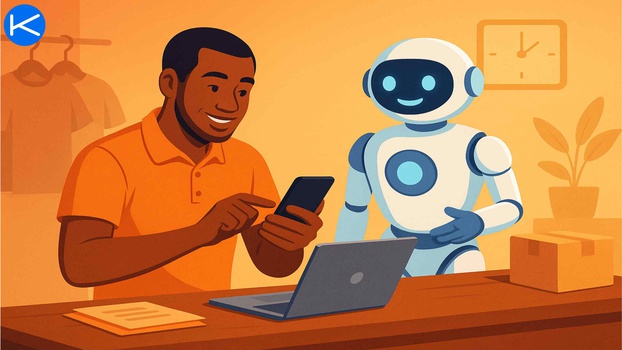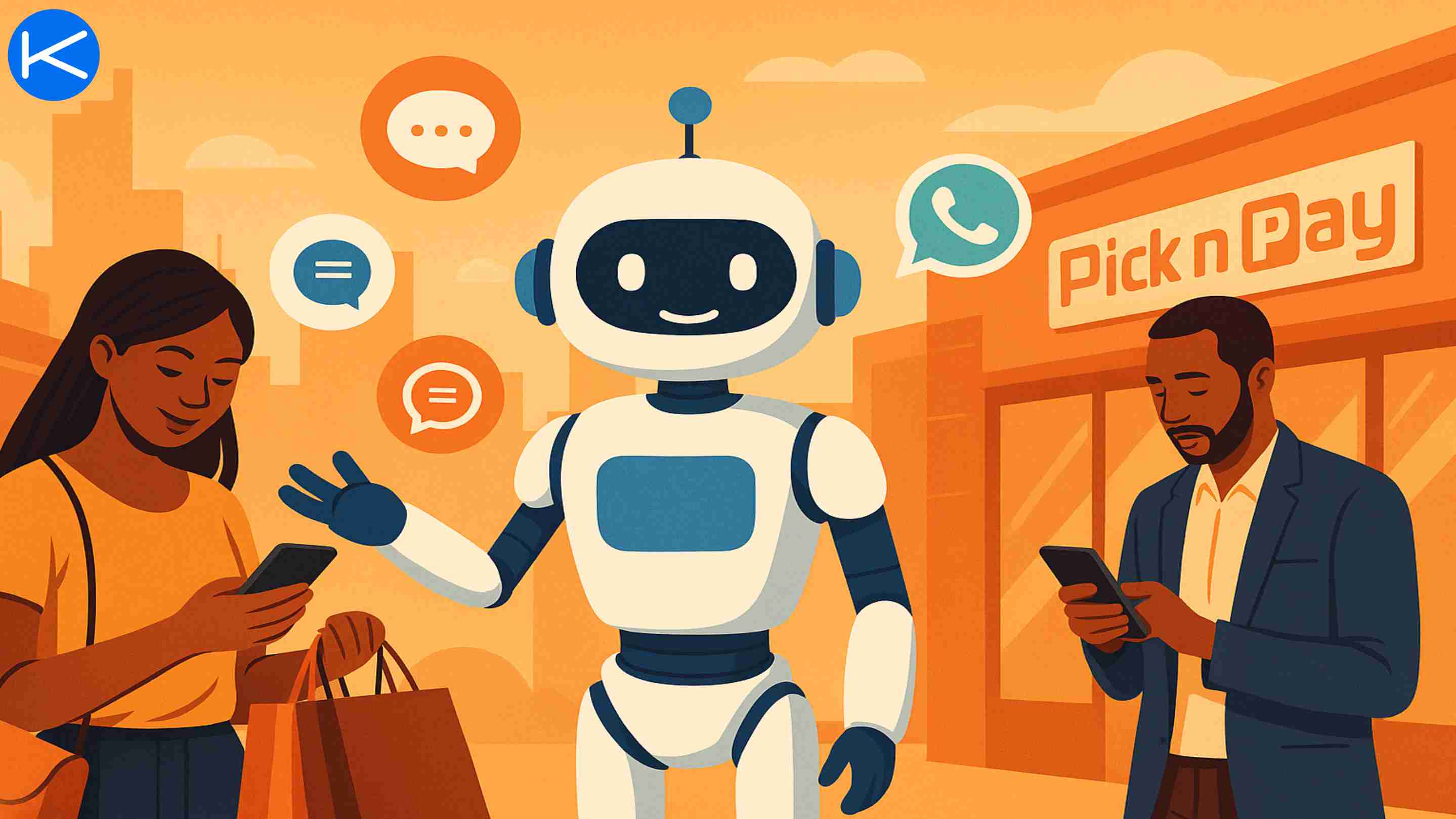Lethabo Moroka
6 months, 3 weeks
How Karabo Empower Micro and Small Enterprises

In the heart of South Africa’s vibrant informal economy, micro and small enterprises (MSEs) are the unsung heroes driving local growth, employment, and innovation. From spaza shops and street vendors to small service providers and township startups, these businesses face daily challenges such as limited resources, stiff competition, and time constraints. With the rise of digital transformation and the increasing penetration of smartphones and mobile internet, MSEs now have access to tools that were once only affordable to big brands. One of the most impactful tools reshaping this landscape is the AI chatbot. Often underestimated, chatbots have moved beyond novelty and are now central to how businesses engage with customers, manage operations, and grow. Whether it’s answering frequently asked questions, booking appointments, sending reminders, or pushing special offers on WhatsApp, AI-powered chatbots offer MSEs a way to compete at a higher level without needing a big team or budget. Karabo.ai, a proudly African platform, understands these needs deeply and is leading the charge in helping local businesses deploy smart, responsive, and multilingual chatbots that truly work. This blog explores exactly how these AI tools empower MSEs not with hype, but with practical outcomes. From saving time and increasing sales, to building stronger customer relationships and unlocking data-driven growth, chatbots are becoming a lifeline for small businesses in South Africa and beyond. So if you’re a salon owner in Soweto, a tech repair guy in Tembisa, or a fashion vendor in Polokwane, here’s how AI chatbots can give you a serious edge in a fast-moving market.
Levelling the Playing Field with Automation

In the world of business, time is money. For many micro and small business owners, there’s never enough of either. Running a hustle in South Africa often means one person is the marketer, the cashier, the delivery driver, and the customer service rep all in one. This is where chatbots come in strong. By handling routine interactions like answering questions, confirming bookings, or checking stock availability, a chatbot frees up the owner’s time to focus on the things that need human attention, like growing the business or serving in-person customers better.
Automation helps create consistency, even when the business owner is offline. Imagine a customer messaging your WhatsApp at 9pm asking for your service price list or store hours instead of missing that opportunity, your chatbot responds instantly with accurate info. This kind of responsiveness builds trust, keeps customers engaged, and makes your business feel “always on”, even if you’re not always available. It brings a level of professionalism that customers now expect, even from small businesses.
What’s more, automation doesn’t mean losing the human touch. Smart chatbot platforms like Karabo.ai allow small businesses to build flows that reflect their tone, language, and personality. You can greet customers in isiZulu, Tshivenda or Tswana, use local slang if you want, and guide them through their journey in a way that feels personal, even if it’s automated. That’s where the magic lies in offering both efficiency and a customised touch.
Ultimately, automation is not just about saving time it’s about creating space for strategic thinking. When small business owners can trust that their bots are handling repetitive tasks, they can focus more on planning, networking, refining products, and attending to customer needs in real life. It’s a small shift that makes a massive difference.
Boosting Sales and Customer Engagement
One of the biggest benefits of using chatbots in small businesses is how they help drive more sales. Whether you’re selling handmade accessories, airtime, or running a mobile beauty bar, your chatbot can act as a silent salesperson always ready, always friendly. You can load your product catalogue into your bot, allow people to browse and order directly, or even run exclusive promotions that create excitement and urgency. It’s like having an online store inside your messaging app.
Customer engagement also improves when a chatbot is in play. You can set up regular check-ins, like asking customers how their last service was, reminding them about upcoming appointments, or suggesting products based on past purchases. This kind of follow-up builds loyalty and keeps your brand top-of-mind. Plus, it shows customers that you care about their experience, which is a big deal in a world full of options.
Chatbots also reduce the friction that often blocks a sale. Instead of waiting for you to reply to a message, potential buyers can get the information they need instantly. They can place an order, make a booking, or ask about payment methods in seconds. And if they don’t convert right away, the chatbot can follow up with a friendly message later on increasing your chances of closing the sale.
The key is that sales and customer care go hand in hand. A chatbot allows MSEs to handle both at scale, with less stress. For businesses with limited time and manpower, that’s a serious competitive advantage. When your customers feel seen and served, they come back — and they tell their friends too.
Making Marketing More Effective and Affordable

Marketing can be expensive, especially for small businesses trying to make an impact on social media, Google, or even just printing flyers. But with a chatbot, especially on platforms like WhatsApp, marketing becomes a lot more accessible and targeted. You can create broadcast lists, send specials or updates directly to interested customers, and segment your audience by purchase behaviour or location all without spending big bucks.
Let’s say you run a bakery and want to promote your weekend specials. Instead of hoping people see your Instagram post, your chatbot can send a message to your customer list on Friday afternoon, reminding them of your fresh scones and cakes. That kind of direct communication works wonders, because it’s personal, timely, and actionable.
Another strong point of chatbot-driven marketing is that it’s two-way. You’re not just talking at customers they can respond, ask questions, or give feedback. This interaction builds relationships and gives you better data on what your customers actually want. Over time, you’ll learn which products are popular, which promotions work best, and what messaging gets the most clicks. That’s powerful insight, especially when you’re trying to grow smartly.
Even for businesses operating on tight budgets, chatbots offer high return on investment. With platforms like Karabo.ai, you can launch a full marketing campaign using your WhatsApp bot, without hiring a full agency or learning complicated ad tools. It’s DIY marketing for the digital age — affordable, scalable, and highly effective.
Enhancing Customer Support and Retention
Customer support can make or break a small business. If a customer struggles to reach you or feels ignored, chances are they’ll take their money elsewhere. Chatbots solve this by providing 24/7 support on common queries, improving response times and customer satisfaction. Even if you're busy cutting hair or delivering an order, your bot keeps the conversation going, making sure customers feel attended to.
Retention is where many small businesses struggle. It’s easy to attract first-time buyers with a discount or hype, but keeping them coming back requires consistent value and care. Chatbots help by enabling loyalty programs, feedback forms, and follow-ups that deepen the relationship. You can set up a thank-you message after every sale or a birthday greeting with a small discount simple touches that make a big impression.
Another often-overlooked use of chatbots is educating customers. Whether it’s how to use your product, what ingredients are in your food, or how to prepare for a booked service, your bot can provide information in a user-friendly, step-by-step way. This not only reduces complaints but boosts confidence in your brand.
Good customer support isn’t just about solving problems it’s about creating a smooth, enjoyable experience that brings people back. For MSEs, this kind of experience used to be hard to deliver consistently. With a chatbot in your corner, it becomes easy, reliable, and scalable.
Gathering Insights and Making Better Decisions

Many small business owners make decisions based on gut feel — and while intuition matters, data gives you the full picture. Chatbots collect useful information during every interaction. You’ll see which products get the most attention, what times people message you, and which questions they ask most. This helps you spot trends and refine your offering.
Imagine seeing that 70% of your bot traffic happens after 6pm. That insight might convince you to extend your delivery hours or run evening promotions. Or maybe your bot logs show that people often ask about delivery areas time to add a delivery zone explainer in your marketing. The more you know, the better you can serve.
You can also track user satisfaction. Karabo.ai chatbots can include quick surveys or feedback options. After a service is completed or a sale is made, your bot can ask “How was your experience today?” That kind of feedback loop is gold for continuous improvement and helps you stay ahead of problems.
At the end of the day, informed decisions lead to smarter growth. Whether it’s changing your pricing, improving your service, or launching a new product, data from your chatbot gives you a solid foundation to work from. It’s like having your own mini research team — built right into your business.
Improving Access Through Mobile and Messaging Channels
South Africa is a mobile-first country. Most people access the internet through their phones, not desktops or laptops. This means that businesses especially small ones must meet customers where they are: on apps like WhatsApp, Facebook Messenger, and SMS. Karabo.ai makes it easy to deploy chatbots directly into these popular channels, which gives MSEs direct access to customers in real-time, using platforms they already trust and use every day.
For example, a WhatsApp chatbot can help a hair salon confirm appointments, remind clients of their bookings, and collect deposits, all through simple conversations. No website or app is needed — just mobile data and a familiar interface. That makes customer engagement simpler and more inclusive, especially for those in rural areas or informal settlements. The ease of use also helps reduce the digital divide between businesses with tech teams and those with just a smartphone and a dream.
Chatbots in messaging apps also help overcome language barriers. Many platforms, including Karabo.ai, allow businesses to create flows in multiple local languages. So whether your customer speaks isiZulu, Sesotho, or Tshivenda, your chatbot can speak back to them in a way that feels familiar and warm. That kind of connection builds loyalty and shows respect for local culture — an important value in any Mzansi-based business.
At the end of the day, access matters. When a small business makes it easier for people to reach them, ask questions, and buy — using tools they already have — they win. Chatbots in messaging channels remove barriers, increase visibility, and help MSEs become more responsive and reliable. It’s smart business that meets people where they are.
Reducing Missed Opportunities and Human Error
One common challenge for small business owners is missing out on leads and sales due to late replies, lost messages, or plain forgetfulness. It happens you’re busy running errands, attending events, or just taking a break. But in the age of instant communication, a delay in response can mean a lost customer. That’s where chatbots step in to reduce missed opportunities and help you stay on top of things.
With a well-designed chatbot, you can make sure that every enquiry is answered instantly — whether it's a question about your operating hours, a quote request, or a booking. Even if you’re asleep, your bot is awake and handling things like a digital PA. You can also set up reminders for yourself or your clients, so no one forgets their appointments or payment deadlines. It's like having a reliable assistant who never drops the ball.
Bots are also much less prone to error than humans when it comes to routine communication. No more sending the wrong price, forgetting to collect a phone number, or overlooking a booking. Chatbot flows are consistent and repeatable, which ensures that every customer gets the same clear, professional experience every time. That consistency builds your reputation and makes your business seem bigger and more organised than it may actually be.
Lastly, reducing human error also means reducing stress. Small business owners carry a heavy load, and even small mistakes can feel overwhelming. By handing over repetitive tasks to a bot, you create more space to breathe and reduce mental clutter. That emotional relief is a huge win — and one that helps business owners stay motivated and avoid burnout.
Creating Scalable Customer Journeys

Growth is the goal for most small businesses. But with growth comes complexity more customers, more enquiries, more admin. Scaling up can be overwhelming if your systems aren’t ready. Chatbots offer a way to build repeatable, scalable customer journeys that grow with your business, not against it. With Karabo.ai, you can design structured flows that adapt to different types of customers and handle increasing demand without needing extra hands.
Let’s say you’re a mobile car wash business that started with 10 clients a week but now handles 100. Instead of hiring more people just to manage messages and bookings, your chatbot can take over that entire workflow collecting addresses, scheduling slots, and sending payment links. Whether 10 or 1,000 people message your business, the bot can handle it with ease and without delay.
Scalable chatbot journeys also help you maintain quality. As more customers come through the funnel, your bot ensures that each one gets the same helpful information and warm welcome. That level of consistency helps you build a strong brand identity and customer trust — which are both key for sustainable growth. You won’t need to compromise service just because things get busy.
Plus, with integrations like Google Sheets, payment gateways, and CRM tools, your chatbot can also help you manage backend tasks as your business grows. Everything from order tracking to customer segmentation can be automated or semi-automated. So as your customer base grows, your business systems grow right alongside — no panic, no chaos, just smart, smooth scaling.
Encouraging Innovation in Township and Rural Businesses
One of the most exciting impacts of AI chatbots is how they fuel innovation in unexpected places. In townships, rural towns, and peri-urban areas where access to traditional tech infrastructure may be limited, chatbots level the field. You don’t need a fancy website or app to build a digital business you just need a mobile-friendly chatbot. This opens doors for a new wave of local entrepreneurs to enter the digital economy in a way that’s low-cost but high-impact.
We’ve seen hairdressers in Diepsloot take bookings via WhatsApp bots, farmers in Limpopo sell produce with Facebook Messenger bots, and mechanics in Mthatha answer repair queries using automated SMS. These are real stories of tech-powered hustles thriving with the help of AI tools that don’t require big teams or coding skills. Karabo.ai’s low-code platform empowers ordinary people to build extraordinary customer experiences.

What’s even more powerful is how these tools encourage experimentation. Small business owners can test different offers, create seasonal promotions, or add new services to their bots without big costs or risk. If it works, they scale it. If it doesn’t, they change it. This spirit of trial and error is where true innovation lives and chatbots make that process fast, fun, and accessible.
Finally, when local businesses thrive, so do communities. When a small entrepreneur uses a chatbot to grow, they can hire more people, offer better service, and serve as inspiration for others in their area. It creates a ripple effect of digital empowerment that strengthens the whole local economy. Chatbots, in this way, are not just tools — they’re catalysts for change.

